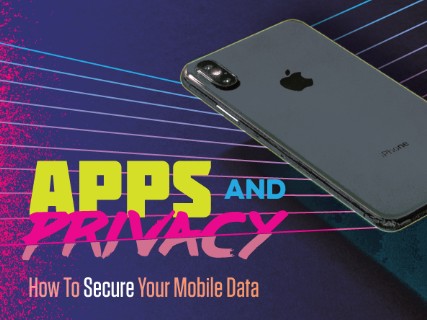November 20, 2019 – User privacy is the subject of today’s guest posting and infographic provided by Demetrius Harrison. This is his third contribution to 21st Century Tech Blog and a timely one with online shopping for the U.S. Black FridayThanksgiving in full swing and Christmas just around the corner. Demetrius notes that the smartphones we all love have an underlying dark side. They can steal personal data and sell it, and knowing this should make us vigilant about ensuring it doesn’t happen. Unfortunately, we can never know enough.
We increasingly rely on our smartphones and the digital economy to manage our money. Between the App Store and Google Play, with approximately 4.27 million apps to download, consumers don’t realize just how vulnerable their personal data is becoming. And in-app advertising continues to grow with expectations it will reach $234 billion by 2025. That’s why we need to consider preventive measures to stop prying apps.
You may not be aware but the apps you download constantly run in background on your smartphone. They track location, memorize passwords and settings, and download information you enter to remote servers. If you think you are one-upping app developers by restricting the use of your information through privacy settings, you are wrong. You still may not be safe.
In 2013, the developers of “Brightest Flashlight Free” failed to inform users it was collecting and sharing their location data and identifiers. The state of New Mexico went after the apps developer, Tiny Lab Products. The state also outed advertising networks run by Google and Twitter, suing them for collecting background data from game consoles without user consent, including those used by children, violating their right to privacy.
The issue of control of our privacy lies with us. Today, phishing has expanded beyond e-mail and is now into mobile devices including tablets, game consoles, smartphones, and desktop and laptop computers. All are vulnerable to data breaches, click fraud, and app security fraud.
How does the digital economy operate? Much like a bill collecting agency selling your data and information to the highest bidder with the excuse of using the information it gathers solely for the purpose to “improve its software.” But that is not the reality. For example, Google is under investigation by the Office for Civil Rights, Department of Health and Human Services, in the United States for its dealings in buying over 50 million private patient health records from several health insurance providers. This raises the question of the effectiveness of HIPAA, the Health Insurance Portability and Accountability Act of 1996 which is enacted in the United States to provide data privacy and security provisions for medical information. Apparently, Google saw an opportunity to take private mental and physical health records and expose them to a plethora of companies working on new software apps.
So what is to become of our online privacy in the face of these data breaches and the wholesale selling of our personal information online?
The Warez Community is the name associated with a group noted for online piracy of both software and personal digital data. From using random credit card generators to opening fake AOL accounts using real names in earlier years, we are now seeing an evolution of apps compromising our personal data and selling it to random companies. Today, we are more prone to identity theft and a lack of online privacy. Most uncomfortably, we have no recourse to access any of the information these companies have acquired about us. Today’s Big Tech is forcing us to accept the lack of control for our personal data.
To counter our loss of privacy, the tips provided in the infographic below should help you to keep a low profile when online, and to avoid known apps that steal your data.










